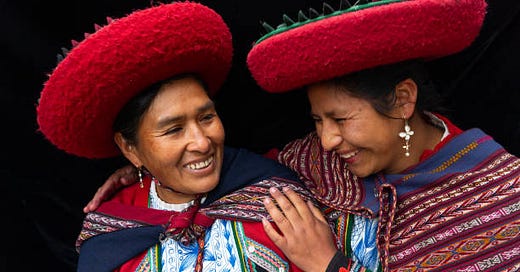We don’t need “the global village”; we need a “globe of villages”.
And when I say need here I don’t mean it in an ethical, or moral, or aesthetic sense. I mean it in the most practical sense: in order to survive we must re-localize.
The global village idea is a non-starter. It misses that complex adaptive systems of a certain class typically have a characteristic scale. That is, a certain size at which they necessarily are realized. Nearly every adult human being you will ever meet will be between five and seven feet tall. And you will not find a land mammal larger than an elephant. Simply, a bigger elephant can’t exist — it would collapse on itself.
So it is with the village. You can’t just inflate it to arbitrary proportions and get the same kind of thing, or expect to get something that works at all, that doesn’t collapse on itself. In attempting to create a massive village, you destroy everything that makes something a “village” to begin with.
But it’s not just the “global village” that won’t work. It’s all of the global designs that those with large-scale agendas are trying to shove us into. They won’t work because they can’t work — something that would dissuade their architects if they understood it.
The essence of life is patterns that persist in the face of fluctuations.
The demand for a global order is often framed in a way that acknowledges this simple truth: for instance calls that we must act in unison at the global scale to combat climate change.
The problem is that most of our problems are not global, but much more local. And the danger of committing to a global order to address the large problems, are the constraints that make it impossible to address the smaller-but-no-less-crucial ones. Locally, we must be free to address problems that arise, including those that that no one foresaw. If we are over-constrained by a large-scale design we will not be able to do that.
And this is why localism is coming, whether we want it or not. And we can do this the easy way, or the hard way.
Problems don’t come in a single size: some are very small, some are very large, and crucially, many are in-between. Libertarians recognize the very-small; those who demand a global order recognize the very-large; the medium-sized problems demand that we act as local communities — relatively free from the demands of a global order but in a way that coordinates local actors for addressing threats to local sociocultural persistence.
In technical terms what we need is multiscale variety. We need to be able to respond to the myriad challenges we face, and in order to do that we need a variety of possible responses, and we need their scale to match the scales of the problems themselves.
In political speak we often hear of the need for diversity. But this is typically framed as something that occurs only at the resolution of the individual. That is, “diversity” is meant to imply diverse individuals as part of some larger common aggregate. The ideological battle line becomes “diversity of background” vs. “diversity of thought”. But both of these notions, while perfectly valid to strive for in various setting, miss that in order to have “diversity” at any scale larger than the individual, we need patches of humans that are “less diverse” locally. Diversity at one scale only is an impoverished kind of diversity.
We don’t only want diverse individuals, we need diverse cultures, diverse ways of life, diverse villages.
The “global village” approach that we are seeing pushed seeks human homogeneity. A village can’t have more than one culture.
As I keep repeating, this can’t work. We need local cultures that can solve the local problems that they uniquely face — there is no other way. And consistent with this, humans have a deep impulse to self-differentiate, at both individual and group scales.
So much of our societal tension stems from a denial of these basic facts, and an insistence that it ought to be otherwise. So much of that tension could be resolved with a release of this denial.
I said this need is practical, not necessarily ethical, moral, or aesthetic. But in solving for this practical issue we will regain these other dimensions. Beauty, hospitality, diversity. Just as we have individual character, we need character of location. Places will be different again. Peoples will be distinct again. We will be whole again
It is not in sameness that we find wholeness, but in difference and complement. We need a globe of villages.








Lucid. Mass media is an expression of homogenized globalism promoting errant narratives. We would benefit from more myth busting.